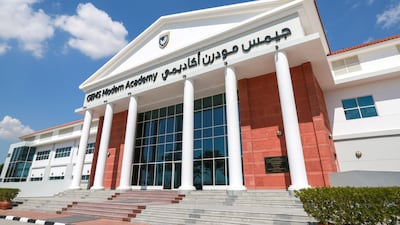Fresh Emirati graduates will be trained to be teachers under a new drive by the country's largest school operators.
The Taaleem education group is set to launch a programme in September to train young Emiratis straight out of school or college to work as teachers.
It also plans to create more apprentice programmes for Emiratis, with the aim of training them to be school leaders.
Gems Education said it will also recruit Emirati graduates, as education companies seek to hit Emiratisation targets.
American Academy for Girls
Companies with more than 50 employees are now required to ensure that 2 per cent of their workforce is Emirati. Employers in free zones are exempt.
The minimum number of Emirati staff required in companies will increase to 4 per cent by January 1, 2024, rising to 10 per cent by the end of 2026.
Last week, Abdulrahman Al Awar, Minister of Human Resources and Emiratisation, urged employers to expand efforts to meet next year's Emiratisation target and singled out schools.
More than a number
Taaleem, which runs 26 schools, employs 204 Emiratis out of a workforce of more than 3,000. It hired between 30-35 Emiratis in 2022.
“It’s not just about meeting a target or a number. It's very important that we attract Emiratis to the education sector, which has not traditionally been a sector that has attracted a lot of Emiratis,” said Talat Goldie, human resources director at Taaleem.
“We've actually got a five-year strategy that we've put in place that we have shared with the Knowledge and Human Development Authority. We have been in talks with the KHDA.”
Their project to train Emiratis will be launched in the new academic year in September.
“If we can attract Emiratis, at a young age after they have completed high school, or completed two years of college, we can bring them in as learning assistants,” Ms Goldie said.
“We feel that is something that will be long-lasting.”
Ms Goldie said Taaleem wants to invest in Emirati talent and give them intensive training programmes, similar to those run by banks.
“We can put them through a three to five-year plan, where they emerge as strong teachers, leading to them becoming vice principals and principals in our schools. That's really our ultimate goal, to have Emirati principals at our schools,” Ms Goldie said.
She said that Taaleem will look to attract untapped Emirati talent in the Northern Emirates, and possibly those who have just graduated from high school in Ajman, Fujairah, Ras Al Khaimah.
In November, the Abu Dhabi Department of Education and Knowledge launched a leadership version of its home-grown talent incubator, the Emirati Recruitment Initiative.
Its latest recruitment drive is aimed at attracting experienced Emirati educators to charter schools in Abu Dhabi.
Successful Emirati recruits will have access to specialised training and pathways to job opportunities as principals and vice principals across the Charter School network.
Three previous recruitment drives were carried out to hire teachers, administrators, counsellors, social workers and parent-relations executives. They attracted more than 300 UAE citizens and enabled the placement of 145 Emirati education professionals across charter schools.
Emirati teacher inspires others
Emirati Hind Al Zarouni, academic dean of pupils at American Academy for Girls, said she likes the work-life balance that she has working in education.
“When we work in education we educate our next generation and we get the chance to support and guide them,” Ms Al Zarouni said.
“I love the balance and I love being able to spend time with my family during school holidays and I love that I can be busy with the pupils during the school day and have the other half of the day to myself.”
Ms Al Zarouni, who has been working at the school since 2021, said people were increasingly becoming aware of the education sector.
“People think it’s very easy and think that the business sector is very challenging. I disagree with that and I think people need to be aware of the fact that teaching isn’t something that everyone can do,” said Ms Al Zarouni.
“It takes a lot of patience and skills to be part of this sector.”
Source new graduates

Gems Education is also looking to boost the number of Emirati staff it employs.
Fatima Al Shamsi, head of the organisation's Emiratisation programme, said Gems will sign an agreement this year with the Higher Colleges of Technology to help them enrol graduates in their teaching and school management programmes.
“I'm looking forward to increasing the number more. We are not going to stop,” said Ms Al Shamsi.
In December, it launched a year-long on-the-job Arabic and Islamic novice teacher induction programme designed to support fresh Emirati graduates and prepare them for jobs in Arabic language and Islamic education departments.
Upon completion of the programme, trainees will be considered for entry-level Arabic or Islamic teacher positions in Gems schools.
Essa Al Mulla, the National Workforce Development chief of the Emirates National Development Programme (ENDP), said the programme introduced by Gems “is a fundamental component to attract, retain and ensure career progression for Emiratis”.










